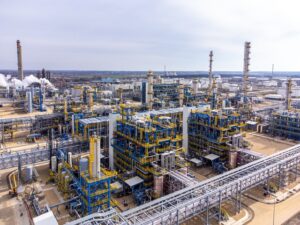MOL Group (Budapest, Hungary) announced the inauguration of its €1.3-billion polyol complex in Tiszaújváros, Hungary. The new facility has a production capacity of around 200,000 metric tons per year (m.t./yr) of polyol per year. The ceremony, addressed by Prime Minister of Hungary Viktor Orbán, MOL’s Chairman-CEO, Zsolt Hernádi, and thyssenkrupp Board member Ilse Henne, marks a significant milestone for the company.
MOL, thyssenkrupp and Evonik IP signed the license agreement for the project in 2017, and the foundation stone of the complex was laid in September 2019.
The main units were transported to Tiszaújváros between 2019 and 2020, mainly by water, and were followed by the completion of the complex’s hydrogen peroxide, propylene oxide, polyol and propylene glycol plants. In addition to the four main plants, a pilot polyol plant, a quality assurance laboratory and, in Százhalombatta, a Research and Development Center were also built.

This €1.30billion project is MOL’s largest organic investment to date (Source: MOL Group)
The project involved an international team of thousands of experts, with engineering design work carried out in Germany, Thailand, India and Hungary. The plant equipment came from 24 countries. The construction of the complex involved 75 000 cubic meters of concrete, 13 000 tons of steel, 2 500 kilometers of cable and 700 km of pipelines laid in more than 18 million working-hours. The Hungarian government contributed with €131.5 million to the project: a €93.6 million corporate tax credit, which can be claimed once the investment is operational, and a €37.9 million investment grant based on an individual government decision.
Polyol is an essential plastic raw materials, used in a wide range of industries from car manufacturing to clothing and insulation. Polyurethane is made from polyol and is the base material for many of the durable consumer goods, such as foam mattresses, insulating materials, sealants, adhesives and rubber products, such as footwear.
The Tiszaújváros plant will produce polyol using one of the most efficient and environmentally friendly methods available today. According to MOL’s calculations, the plant will contribute nearly €150 million annually to the MOL Group’s financial results and will provide long-term employment for nearly 300 people.
In another announcement bolstering Hungary’s chemicals supply chain, LyondellBasell and Maersk are establishing a large distribution hub.